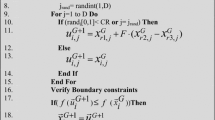Abstract
Evolutionary algorithms (EAs) are widely used for a variety of optimization problems, most of them with the presence of constraints. As move operators are usually blind to the constraints, (i.e. when operating upon feasible individuals they do not necessarily generate feasible offspring) standard EAs must be equipped with a constraint handling technique. This paper focuses on exactly satisfying the linear equality constraints present in continuous optimization problems that may also include additional non-linear equality and inequality constraints. The proposed method, named DELEqC-III, is an extension of two other previously developed methods. In this work, the original constrained problem (in \({\mathbb {R}}^n\)) is transformed into a lower-dimensional (\({\mathbb {R}}^{n-m}\)) unconstrained optimization problem, where n is the number of variables and m is the number of linear equality constraints. DELEqC-III performs the search in the null space associated with the linear equality constraints allowing the method to exactly satisfy such constraints. In order to show the efficiency of the method, scalable test-problems are used to analyze the performance of the new proposal.












Similar content being viewed by others
Notes
In the computational experiments, the matrix Z was obtained by performing the Matlab® command Z = null(E,’r’) which provides a rational basis for the null space obtained from the reduced row echelon form. However, any other procedure to solve the homogeneous system \(Ex=0\) can be used to generate the matrix Z.
References
Kusakci AO, Can M (2012) Constrained optimization with evolutionary algorithms: a comprehensive review. South East Europe J Soft Computing 1(2):16–24
Hamida SB, Petrowski SB (2000) The need for improving the exploration operators for constrained optimization problems. in: Proc. of the 2000 Congress on Evolutionary Computation 2:1176–1183 (vol2)
Mezura-Montes E, Coello CAC (2005) A simple multimembered evolution strategy to solve constrained optimization problems. IEEE Trans Evol Comp 9(1):1–17
Datta R, Deb K (eds) (2015) Evolutionary constrained optimization. Infosys Science Foundation Series, Springer India
Mezura-Montes E, Coello CAC (2011) Constraint-handling in nature-inspired numerical optimization: Past, present and future. Swarm Evol Comput 1(4):173–194
Craenen B, Eiben A, Marchiori E (2000) How to handle constraints with evolutionary algorithms. In: Chambers LD (ed) The Practical Handbook of Genetic Algorithms: Applications. Chapman and Hall/CRC, pp 341–361
Eiben AE, Smith JE (2015) Introduction to evolutionary computing, 2nd edn. Springer Publishing Company, Incorporated
Brust JJ, Marcia RF, Petra CG, Saunders MA (2021) Large-scale optimization with linear equality constraints using reduced compact representation . arXiv: 2101.11048
Nassif R, Richard C, Ferrari A, Sayed AH (2017) Diffusion lms for multitask problems with local linear equality constraints. IEEE Trans Signal Process 65(19):4979–4993. https://doi.org/10.1109/TSP.2017.2721930
Szabo BA, Kassos T (1975) Linear equality constraints in finite element approximation. Int J Numeri Methods Eng 9(3):563–580. https://doi.org/10.1002/nme.1620090306
Barrett JW, Chakrabarti R (1991) Finite element approximation of the volume-matching problem. Numerische Mathematik 60:291–313. https://doi.org/10.1007/BF01385725
Lofdahl MG (2002) Multiframe blind deconvolution with linear equality constraints. In: Bones PJ, Fiddy MA, Millane RP (eds) Image Reconstruction from Incomplete Data II, vol 4792. International Society for Optics and Photonics, SPIE, pp 146–155. https://doi.org/10.1117/12.451791
Ullah ASB, Sarker R, Lokan C (2012) Handling equality constraints in evolutionary optimization. Eur J Oper Res 221(3):480–490
Michalewicz Z, Janikow CZ (1996) GENOCOP: A genetic algorithm for numerical optimization problems with linear constraints., Commun. ACM 39 (12es) 175–201
Paquet U, Engelbrecht A (2003) A new particle swarm optimiser for linearly constrained optimisation. IEEE Congr Evol Comput 1:227–233
Paquet U, Engelbrecht AP (2007) Particle swarms for linearly constrained optimisation. Fundamenta Informaticae 76(1):147–170
Monson CK, Seppi KD (2005) Linear equality constraints and homomorphous mappings in PSO, in: IEEE Congress on Evolutionary Computation, Vol. 1, pp. 73–80
Helwig S(2010) Particle swarms for constrained optimization, Ph.D. thesis, Technischen Fakultat der Universitat Erlangen-Nurnberg, Erlangen
Spettel P, Beyer H, Hellwig M (2019) A covariance matrix self-adaptation evolution strategy for optimization under linear constraints. IEEE Trans Evol Comput 23(3):514–524
Barbosa HJC, Araujo RL, Bernardino HS (2015) A differential evolution algorithm for optimization including linear equality constraints, in: Progress in Artificial Intelligence: 17th Portuguese Conf. on Artificial Intelligence, EPIA 2015, Coimbra, Portugal, September 8-11, 2015. Proceedings, Springer International Publishing, Cham, pp. 262–273
Barbosa HJC, Bernardino HS, Angelo JS (2019) An improved differential evolution algorithm for optimization including linear equality constraints. Memetic Comput 11(3):317–329
Bernardino HS, Barbosa HJC, Angelo JS (2018) Differential evolution with adaptive penalty and tournament selection for optimization including linear equality constraints, in: IEEE Congress on Evolutionary Computation, pp. 1–8
Barbosa HJC, Lemonge ACC (2003) A new adaptive penalty scheme for genetic algorithms. Inf Sci 156:215–251
Deb K (2000) An efficient constraint handling method for genetic algorithms. Comput Methods Appl Mech Engrg 186:311–338
Storn R, Price KV (1997) Differential Evolution - a simple and efficient heuristic for global optimization over continuous spaces. J Glob Optim 11:341–359
Price KV (1999) An introduction to Differential Evolution, New Ideas in Optimization 79–108
Das S, Mullick SS, Suganthan P (2016) Recent advances in differential evolution - An updated survey. Swarm Evol Comput 27:1–30
Friedlander A (1994) Elements of non-linear programming (in portuguese). UNICAMP, Campinas, Brazil
Price K, Storn RM, Lampinen JA (2005) Differential Evolution: A Practical Approach to Global Optimization, Springer,
Barbosa HJC, Lemonge ACC (2002) An adaptive penalty scheme in genetic algorithms for constrained optimization problems, in: Langdon, W.B. et al. (Ed.), Proc of the Genetic and Evolutionary Computation Conference, USA,
Colville AR () A comparative study on nonlinear programming codes, IBM New York Scientific Center, Report No. 320-2949
Himmelblau DM (1972) Applied nonlinear programming. McGraw-Hill, New York
Vaz AIF, Vicente LN (2009) PSwarm: a hybrid solver for linearly constrained global derivative-free optimization. Optim Methods Softw 24(4–5):669–685
Dolan E, Moré JJ (2002) Benchmarking optimization software with performance profiles. Math Program 91(2):201–213
H. J. C. Barbosa, H. S. Bernardino, A. M. S. Barreto, Using performance profiles to analyze the results of the (2006) CEC constrained optimization competition. IEEE Cong Evol Comput 2010:1–8
Khorramizade M, Mahdavi-Amiri N () An efficient algorithm for sparse null space basis problem using ABS methods, Numerical Algorithms 62
Acknowledgements
The authors would like to thank the reviewers for their comments, and the financial support of CNPq (312337/2017-5 and 312682/2018-2), FAPEMIG (APQ-00337-18), and PNPD/CAPES (88882.317532/2019-01).
Author information
Authors and Affiliations
Corresponding author
Additional information
Publisher's Note
Springer Nature remains neutral with regard to jurisdictional claims in published maps and institutional affiliations.
Supplementary Information
Below is the link to the electronic supplementary material.
Rights and permissions
About this article
Cite this article
Angelo, J.S., Barbosa, H.J.C. & Bernardino, H.S. Differential Evolution for linear equality constraint satisfaction via unconstrained search in the null space. Evol. Intel. 16, 565–586 (2023). https://doi.org/10.1007/s12065-021-00682-y
Received:
Revised:
Accepted:
Published:
Issue Date:
DOI: https://doi.org/10.1007/s12065-021-00682-y




